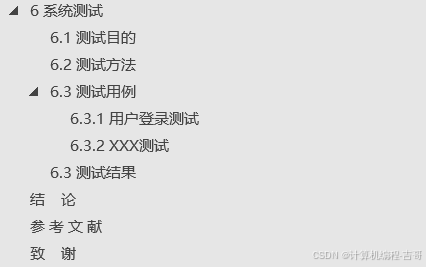本文主要是介绍计算机毕业设计 大学志愿填报系统 Java+SpringBoot+Vue 前后端分离 文档报告 代码讲解 安装调试,希望对大家解决编程问题提供一定的参考价值,需要的开发者们随着小编来一起学习吧!
🍊作者:计算机编程-吉哥
🍊简介:专业从事JavaWeb程序开发,微信小程序开发,定制化项目、 源码、代码讲解、文档撰写、ppt制作。做自己喜欢的事,生活就是快乐的。
🍊心愿:点赞 👍 收藏 ⭐评论 📝
🍅 文末获取源码联系👇🏻 精彩专栏推荐订阅 👇🏻 不然下次找不到哟~
Java毕业设计项目~热门选题推荐《1000套》
目录
1.技术选型
2.开发工具
3.功能
3.1【角色】
3.2【前端功能模块】
3.3【后端功能模块】
4.项目演示截图
4.1 注册
4.2 招生信息
4.3 志愿填报
4.4 反馈建议
4.5 录取信息
4.6 招生信息管理
4.7 志愿填报管理
4.8 录取信息管理
5.核心代码
5.1拦截器
5.2分页工具类
5.3文件上传下载
5.4前端请求
6.LW文档大纲参考
背景意义介绍:
在高等教育领域,志愿填报是学生选择大学和专业的重要环节,对学生的未来职业发展和个人成长具有深远的影响。因此,开发一个高效、透明、便捷的大学志愿填报系统对于帮助学生做出明智选择、优化招生流程、提升教育服务质量具有重要的现实意义。
本文介绍的大学志愿填报系统,采用Java作为后端开发语言,结合SpringBoot框架,确保了服务端应用的高效性和稳定性。前端则利用Vue.js技术,为用户提供了直观、易用的交互界面。系统服务于管理员、学生和学校三种角色,提供了全面的服务和管理功能。学生可以通过系统查看学校信息、招生信息、参与国际交流、填报志愿和查看录取信息。管理员则可以通过系统进行学校信息管理、招生信息管理、志愿填报管理和录取信息管理。
后端管理模块为管理员提供了包括基础管理、管理员管理、学生管理等在内的强大工具集。这些功能的实现,不仅提高了招生工作的组织和执行效率,也为学生提供了便捷的志愿填报服务。
大学志愿填报系统的实现,有助于构建一个公平、公正的招生环境,促进学生与学校之间的信息沟通,同时通过数据分析和用户反馈机制,持续优化招生政策和教育服务。总之,该系统对于推动高等教育招生工作的信息化、提升学生满意度、促进教育公平具有重要的战略意义。
1.技术选型
springboot、mybatisplus、vue、elementui、html、css、js、mysql、jdk1.8
2.开发工具
idea、navicat
3.功能
3.1【角色】
管理员、学生、学校
3.2【前端功能模块】
- 登录
- 注册
- 首页
- 学校信息
- 招生信息
- 反馈建议
- 国际交流
- 录取信息
- 个人中心(个人中心、修改密码、招生信息、志愿填报、录取信息、我的发布)
3.3【后端功能模块】
- 登录
- 首页
- 基础管理(轮播图、反馈建议、专业类型、省份、公告信息)
- 管理员管理
- 学校信息管理
- 学生管理
- 招生信息管理
- 志愿填报管理
- 录取信息管理
- 国际交流管理
4.项目演示截图
4.1 注册

4.2 招生信息

4.3 志愿填报

4.4 反馈建议

4.5 录取信息

4.6 招生信息管理

4.7 志愿填报管理

4.8 录取信息管理

5.核心代码
5.1拦截器
package com.interceptor;import com.alibaba.fastjson.JSONObject;
import com.annotation.IgnoreAuth;
import com.entity.TokenEntity;
import com.service.TokenService;
import com.utils.R;
import org.apache.commons.lang3.StringUtils;
import org.springframework.beans.factory.annotation.Autowired;
import org.springframework.http.HttpStatus;
import org.springframework.stereotype.Component;
import org.springframework.web.bind.annotation.RequestMethod;
import org.springframework.web.method.HandlerMethod;
import org.springframework.web.servlet.HandlerInterceptor;import javax.servlet.http.HttpServletRequest;
import javax.servlet.http.HttpServletResponse;
import java.io.PrintWriter;/*** 权限(Token)验证*/
@Component
public class AuthorizationInterceptor implements HandlerInterceptor {public static final String LOGIN_TOKEN_KEY = "Token";@Autowiredprivate TokenService tokenService;@Overridepublic boolean preHandle(HttpServletRequest request, HttpServletResponse response, Object handler) throws Exception {//支持跨域请求response.setHeader("Access-Control-Allow-Methods", "POST, GET, OPTIONS, DELETE");response.setHeader("Access-Control-Max-Age", "3600");response.setHeader("Access-Control-Allow-Credentials", "true");response.setHeader("Access-Control-Allow-Headers", "x-requested-with,request-source,Token, Origin,imgType, Content-Type, cache-control,postman-token,Cookie, Accept,authorization");response.setHeader("Access-Control-Allow-Origin", request.getHeader("Origin"));// 跨域时会首先发送一个OPTIONS请求,这里我们给OPTIONS请求直接返回正常状态if (request.getMethod().equals(RequestMethod.OPTIONS.name())) {response.setStatus(HttpStatus.OK.value());return false;}IgnoreAuth annotation;if (handler instanceof HandlerMethod) {annotation = ((HandlerMethod) handler).getMethodAnnotation(IgnoreAuth.class);} else {return true;}//从header中获取tokenString token = request.getHeader(LOGIN_TOKEN_KEY);/*** 不需要验证权限的方法直接放过*/if(annotation!=null) {return true;}TokenEntity tokenEntity = null;if(StringUtils.isNotBlank(token)) {tokenEntity = tokenService.getTokenEntity(token);}if(tokenEntity != null) {request.getSession().setAttribute("userId", tokenEntity.getUserid());request.getSession().setAttribute("role", tokenEntity.getRole());request.getSession().setAttribute("tableName", tokenEntity.getTablename());request.getSession().setAttribute("username", tokenEntity.getUsername());return true;}PrintWriter writer = null;response.setCharacterEncoding("UTF-8");response.setContentType("application/json; charset=utf-8");try {writer = response.getWriter();writer.print(JSONObject.toJSONString(R.error(401, "请先登录")));} finally {if(writer != null){writer.close();}}return false;}
}5.2分页工具类
package com.utils;import java.io.Serializable;
import java.util.List;
import java.util.Map;import com.baomidou.mybatisplus.plugins.Page;/*** 分页工具类*/
public class PageUtils implements Serializable {private static final long serialVersionUID = 1L;//总记录数private long total;//每页记录数private int pageSize;//总页数private long totalPage;//当前页数private int currPage;//列表数据private List<?> list;/*** 分页* @param list 列表数据* @param totalCount 总记录数* @param pageSize 每页记录数* @param currPage 当前页数*/public PageUtils(List<?> list, int totalCount, int pageSize, int currPage) {this.list = list;this.total = totalCount;this.pageSize = pageSize;this.currPage = currPage;this.totalPage = (int)Math.ceil((double)totalCount/pageSize);}/*** 分页*/public PageUtils(Page<?> page) {this.list = page.getRecords();this.total = page.getTotal();this.pageSize = page.getSize();this.currPage = page.getCurrent();this.totalPage = page.getPages();}/** 空数据的分页*/public PageUtils(Map<String, Object> params) {Page page =new Query(params).getPage();new PageUtils(page);}public int getPageSize() {return pageSize;}public void setPageSize(int pageSize) {this.pageSize = pageSize;}public int getCurrPage() {return currPage;}public void setCurrPage(int currPage) {this.currPage = currPage;}public List<?> getList() {return list;}public void setList(List<?> list) {this.list = list;}public long getTotalPage() {return totalPage;}public void setTotalPage(long totalPage) {this.totalPage = totalPage;}public long getTotal() {return total;}public void setTotal(long total) {this.total = total;}}5.3文件上传下载
package com.controller;import java.io.File;
import java.io.FileNotFoundException;
import java.io.IOException;
import java.util.Arrays;
import java.util.Date;
import java.util.HashMap;
import java.util.List;
import java.util.Map;
import java.util.Random;
import java.util.UUID;import org.apache.commons.io.FileUtils;
import org.apache.commons.lang3.StringUtils;
import org.springframework.beans.factory.annotation.Autowired;
import org.springframework.http.HttpHeaders;
import org.springframework.http.HttpStatus;
import org.springframework.http.MediaType;
import org.springframework.http.ResponseEntity;
import org.springframework.util.ResourceUtils;
import org.springframework.web.bind.annotation.PathVariable;
import org.springframework.web.bind.annotation.RequestBody;
import org.springframework.web.bind.annotation.RequestMapping;
import org.springframework.web.bind.annotation.RequestParam;
import org.springframework.web.bind.annotation.RestController;
import org.springframework.web.multipart.MultipartFile;import com.annotation.IgnoreAuth;
import com.baomidou.mybatisplus.mapper.EntityWrapper;
import com.entity.ConfigEntity;
import com.entity.EIException;
import com.service.ConfigService;
import com.utils.R;/*** 上传文件映射表*/
@RestController
@RequestMapping("file")
@SuppressWarnings({"unchecked","rawtypes"})
public class FileController{@Autowiredprivate ConfigService configService;/*** 上传文件*/@RequestMapping("/upload")@IgnoreAuthpublic R upload(@RequestParam("file") MultipartFile file,String type) throws Exception {if (file.isEmpty()) {throw new EIException("上传文件不能为空");}String fileExt = file.getOriginalFilename().substring(file.getOriginalFilename().lastIndexOf(".")+1);File path = new File(ResourceUtils.getURL("classpath:static").getPath());if(!path.exists()) {path = new File("");}File upload = new File(path.getAbsolutePath(),"/upload/");if(!upload.exists()) {upload.mkdirs();}String fileName = new Date().getTime()+"."+fileExt;File dest = new File(upload.getAbsolutePath()+"/"+fileName);file.transferTo(dest);if(StringUtils.isNotBlank(type) && type.equals("1")) {ConfigEntity configEntity = configService.selectOne(new EntityWrapper<ConfigEntity>().eq("name", "faceFile"));if(configEntity==null) {configEntity = new ConfigEntity();configEntity.setName("faceFile");configEntity.setValue(fileName);} else {configEntity.setValue(fileName);}configService.insertOrUpdate(configEntity);}return R.ok().put("file", fileName);}/*** 下载文件*/@IgnoreAuth@RequestMapping("/download")public ResponseEntity<byte[]> download(@RequestParam String fileName) {try {File path = new File(ResourceUtils.getURL("classpath:static").getPath());if(!path.exists()) {path = new File("");}File upload = new File(path.getAbsolutePath(),"/upload/");if(!upload.exists()) {upload.mkdirs();}File file = new File(upload.getAbsolutePath()+"/"+fileName);if(file.exists()){HttpHeaders headers = new HttpHeaders();headers.setContentType(MediaType.APPLICATION_OCTET_STREAM); headers.setContentDispositionFormData("attachment", fileName); return new ResponseEntity<byte[]>(FileUtils.readFileToByteArray(file),headers, HttpStatus.CREATED);}} catch (IOException e) {e.printStackTrace();}return new ResponseEntity<byte[]>(HttpStatus.INTERNAL_SERVER_ERROR);}}5.4前端请求
import axios from 'axios'
import router from '@/router/router-static'
import storage from '@/utils/storage'const http = axios.create({timeout: 1000 * 86400,withCredentials: true,baseURL: '/furniture',headers: {'Content-Type': 'application/json; charset=utf-8'}
})
// 请求拦截
http.interceptors.request.use(config => {config.headers['Token'] = storage.get('Token') // 请求头带上tokenreturn config
}, error => {return Promise.reject(error)
})
// 响应拦截
http.interceptors.response.use(response => {if (response.data && response.data.code === 401) { // 401, token失效router.push({ name: 'login' })}return response
}, error => {return Promise.reject(error)
})
export default http6.LW文档大纲参考



具体LW如何写法,可以咨询博主,耐心分享!
你可能还有感兴趣的项目👇🏻👇🏻👇🏻
更多项目推荐:计算机毕业设计项目
如果大家有任何疑虑,请在下方咨询或评论
这篇关于计算机毕业设计 大学志愿填报系统 Java+SpringBoot+Vue 前后端分离 文档报告 代码讲解 安装调试的文章就介绍到这儿,希望我们推荐的文章对编程师们有所帮助!





